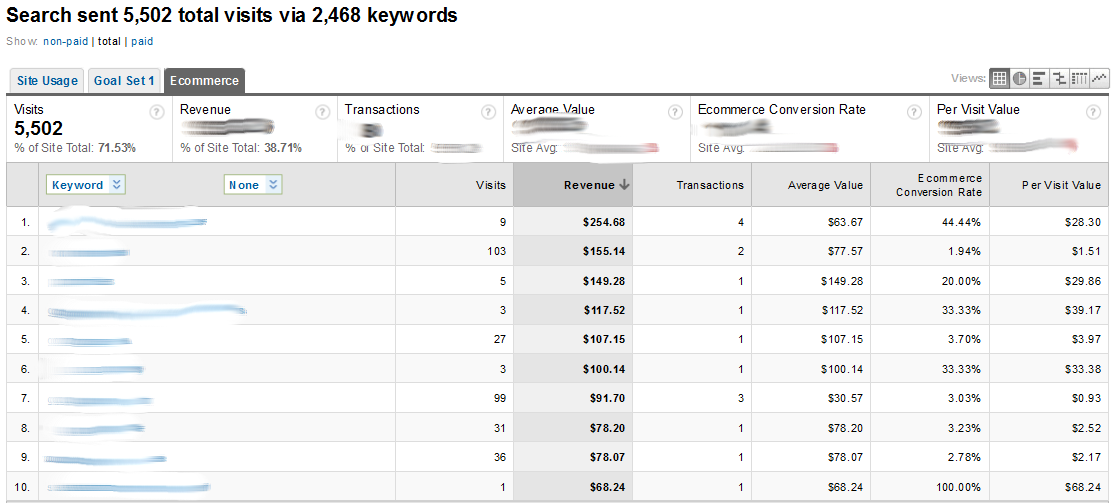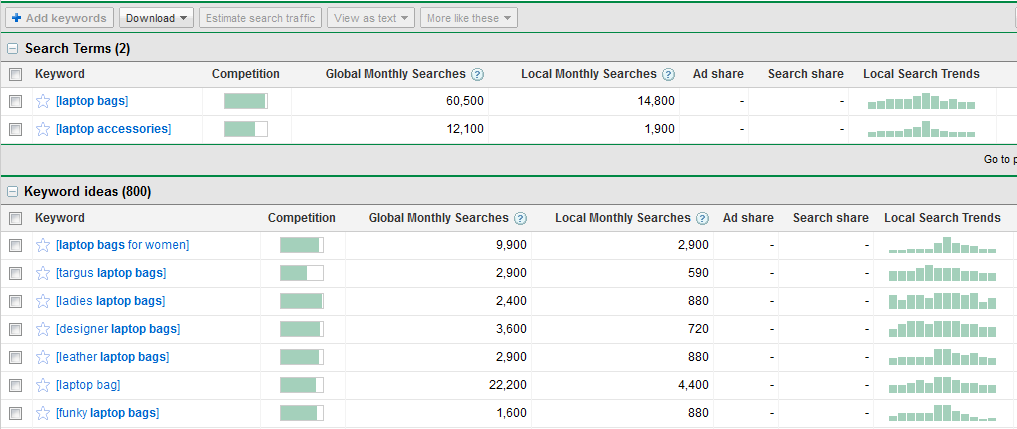
Three Awesome Ways to Leverage Google Analytics in eCommerce SEO
This YouMoz entry was submitted by one of our community members. The author’s views are entirely their own (excluding an unlikely case of hypnosis) and may not reflect the views of Moz.
I love ROI focused search engine optimisation – the kinds of SEO tactics where you know the end result is going to impact on the bottom line.
We are constantly seeking to help our clients leverage Google Analytics in a way that helps them to make more money and create a better user experience through stronger SEO campaigns. Here are three of the ways we do it...
Look for Keyword Visibility Opportunities
Log in to your Google Analytics account and navigate to the keywords option located under the traffic sources tab. Select eCommerce from the tab options inside the keyword report and then sort by revenue.
You should now have an ordered list of your highest revenue keywords – spend some time investigating their 'true' performance.
When I come across keywords that bring in a good level of revenue then it immediately triggers the question in my mind – could we be making more money from this keyword?
The answer to this is nearly always yes because if it brings in for example $200 in revenue presently, imagine what it could be worth to your business if we were to increase search engine visibility on that term - move up the rankings 10, five, or even just one place and it could dramatically impact on sales.
Not just revenue though, you will almost certainly see a positive bottom line impact too and that's because less effort and financial resources are required to nudge a page, that already ranks, a little further up the SERPs.
I've yet to find an automated way of performing this kind of analysis but on the plus side it does give you an actionable hit list of keywords to target that are going to drive more sales – we know this because that keyword already contributes to the revenue figures...you will just be adding more traffic to the mix.
Google Analytics even gives us an indication of revenue per visit so we can make fairly accurate projections of what an increase in traffic would look like in revenue terms.
You can often spot these kinds of keyword opportunities by looking at your more generic keywords and cross-referencing number of visits with an anonymous Google search to check the ranking. You might be bottom of page 1 or top of page 2 for example, so focusing on enhancing visibility on these search terms is a great place to start when it comes to eCommerce SEO. The time you invest in this exercise will pay off.
We tend to focus on generic and medium tale search terms since the time investment versus return may well be edging towards the realms of counter-productivity to perform this kind of optimisation across the long-tail of your keyword portfolio but that call is entirely yours to make.
Look for targeting opportunities
Try as you might to get one of your pages ranking for a particular keyword, sometimes Google will see another page on your website as being more relevant and index and rank that one instead.
In cases like this, it can often cause a high-bounce rate back to the SERPS. Luckily, Google Analytics can help you identify these kinds of issues so that you can put them right and improve the user experience and hopefully make more money.
For example, imagine you sell consumer electronics accessories and you have a page dedicated to laptop accessories and another page specifically listing the laptop bags you sell, common sense tells us that a page specifically about laptop bags would be more relevant to the user who searches for 'laptop bags' but Google might be indexing your page about laptop accessories because it has a little more authority – the user arrives at that page, sees a mixed page of laptop accessories and so heads back to the SERPs.
Had they landed on you page about laptop bags, they may well have selected a product, made a purchase and not bounced at all.
Here's how to spot any targeting issues
Within Google Analytics, under the traffic sources header in the left navigation bar is an option titled keywords, click on that.
You now have the same keyword list as above but this time you are going to use the dimension drop down button which appears just above the data table, and select landing page from the list. This now gives you an insight into the most popular landing page that people arrive at when searching for a particular phrase. It also offers key metrics like bounce rate.
You can now see at a glance which pages have a high bounce rate and which keywords brought people to those pages. (Valuable data in itself)
Now the fun bit, manually diagnosing problem pages – essentially what you are looking to do is identify keywords that send people to the wrong page or keywords where a different landing page would be better.
Lots of websites get traffic to their homepage from keywords that would be better off on a more targeted page.
My advice is to concentrate on your big traffic terms to start with because if the bounce rate is high on those then you are missing a lot of opportunities. This is also where you will see the biggest return on investment because it could deliver a very noticeable impact from just a small amount of effort.
Look for good traffic levels, cross-reference the keyword with the landing page and then reference the bounce rate – you are bound to spot keywords that would perform better if users arrived at a different landing page, sometimes the problem is obvious, but sometimes a little digging is required. Start making a list of all the problem pages.
A page with a high-bounce rate is worth investigating anyway – there could be something that is fundamentally off-putting to users. A few simple fixes could make the world of difference to the performance of that page.
Here's how to fix any targeting issues
Identify the page that would be better suited to targeting that keyword i.e. instead of the homepage you want to send people looking for laptop bags to your category page about laptop bags. The good news is that if you already have a page ranking for this keyword term then getting the right page indexed shouldn't be too much trouble.
Take advantage of the power of internal linking and place an anchor text rich link from the homepage and sitewide sidebar (if applicable) to the desired landing page to power up the authority of that page and the link juice flowing to it. You might even like to build a couple of external links to the landing page for an extra boost.
Within a couple of days, you should hopefully see the desired landing page ranking for the keyword term although initially it is likely to be below the other 'less desirable' landing page – no problem because Google will soon figure out the more relevant one (and give it a boost) once it takes into account the clickthrough rate (which should go up) and bounce rate (which should go down).
Bounce rate is a problem you will want to fix generally because with Google now incorporating user feedback metrics like bounce rate into how it ranks your website – a high bounce rate sends the wrong signals to Google, even if it isn't technically your 'fault'.
Look for keyword portfolio opportunities
There is a lot to be said for optimising the performance of your existing keywords but it is also important to look at expanding the keyword portfolio, to grow traffic and sales overall.
Google Analytics is again very useful for doing this...
Once again you will need to head into the keywords section of the traffic sources area of Google Analytics to pull a list of your best performing keywords.
I usually sort by revenue since working with eCommerce clients is mainly ultimately about achieving sales growth rather than just search engine visibility.
Look for patterns in the high-performance keywords, obvious similarities e.g. 'buy' front-loaded in a search query or less obvious ones e.g. likely stage in the consumer decision making process.
You can build out closely related branch groups or look for keywords in completely different categories that have similarities to the keywords that are already working well for your website.
Google's Keyword Tool is perfect for doing this because it offers up loads of great keyword ideas that you could be targeting. You might also stumble across a new business area or product line that has great search volumes and popularity that your website could be offering to customers.
Leading on from this you should also track site search within Google Analytics as a way of anticipating your customer needs. A great deal of users attempt to search your website if they believe you sell what they want but it isn't immediately obvious.
By tracking what people search for, you can easily spot opportunities to stock new product lines or target different kinds of keyword phrases because you could save users time (and increase your conversion rate) by better optimising your website for the phrases they actually use.
This tutorial from Google explains how to setup site search tracking if you aren't sure how to – it really will be five minutes well spent!
Internal data can be your competitive edge, so make sure you are exploiting yours.
By James Agate, Founder of eCommerce SEO specialist Skyrocket SEO.







Comments
Please keep your comments TAGFEE by following the community etiquette
Comments are closed. Got a burning question? Head to our Q&A section to start a new conversation.